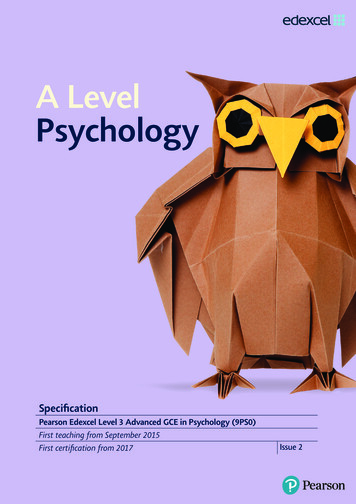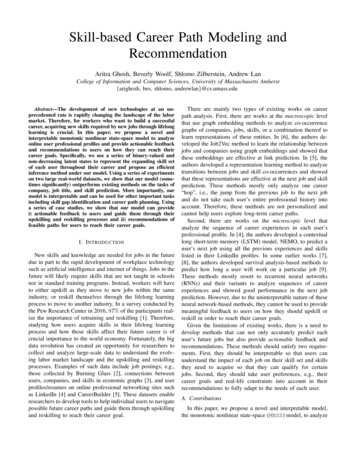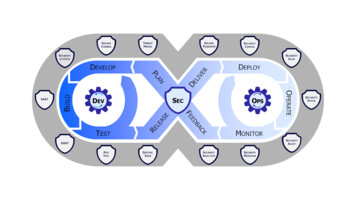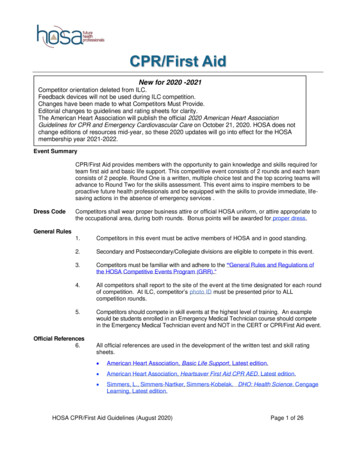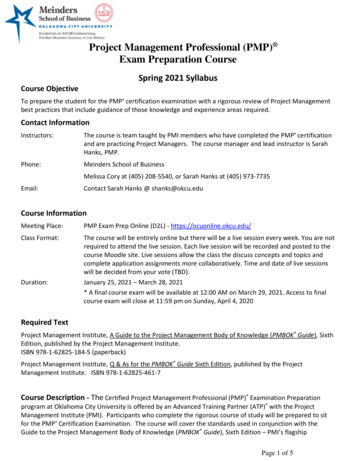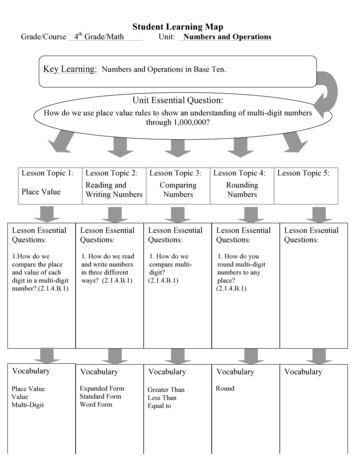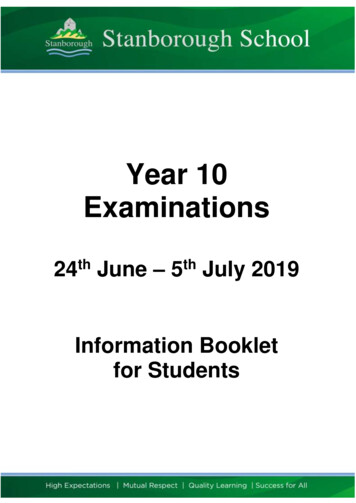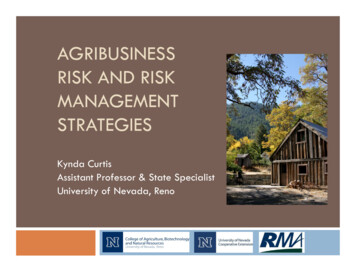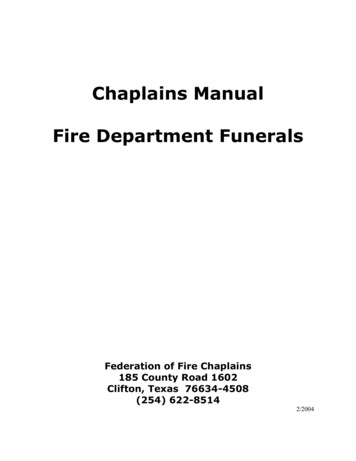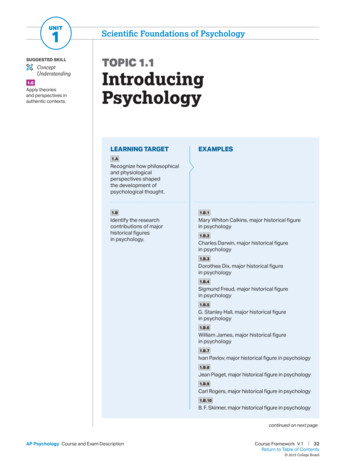
Transcription
UNIT1SUGGESTED SKILLConceptUnderstanding1.CApply theoriesand perspectives inauthentic contexts.Scientific Foundations of PsychologyTOPIC 1.1IntroducingPsychologyLEARNING TARGETEXAMPLES1.ARecognize how philosophicaland physiologicalperspectives shapedthe development ofpsychological thought.1.B1.B.1Identify the researchcontributions of majorhistorical figuresin psychology.Mary Whiton Calkins, major historical figurein psychology1.B.2Charles Darwin, major historical figurein psychology1.B.3Dorothea Dix, major historical figurein psychology1.B.4Sigmund Freud, major historical figurein psychology1.B.5G. Stanley Hall, major historical figurein psychology1.B.6William James, major historical figurein psychology1.B.7Ivan Pavlov, major historical figure in psychology1.B.8Jean Piaget, major historical figure in psychology1.B.9Carl Rogers, major historical figure in psychology1.B.10B. F. Skinner, major historical figure in psychologycontinued on next pageAP Psychology Course and Exam DescriptionCourse Framework V.1 32Return to Table of Contents 2019 College Board
UNIT1Scientific Foundations of PsychologyLEARNING TARGETEXAMPLES1.B1.B.11Identify the researchcontributions of majorhistorical figuresin psychology.Margaret Floy Washburn, major historical figurein psychology1.B.12John B. Watson, major historical figurein psychology1.B.13Wilhelm Wundt, major historical figurein psychology1.C1.C.1Describe and comparedifferent theoreticalapproaches inexplaining behavior.Structuralism1.C.2Functionalism1.C.3Early ynamic1.C.6Humanistic1.C.7Evolutionary approach1.C.8Biological approach1.C.9Cognitive approach1.C.10Biopsychosocial approaches1.C.11Sociocultural1.DRecognize the strengthsand limitations of applyingtheories to explain behavior.continued on next pageAP Psychology Course and Exam DescriptionCourse Framework V.1 33Return to Table of Contents 2019 College Board
UNIT1Scientific Foundations of PsychologyLEARNING TARGETEXAMPLES1.E1.E.1Distinguish the differentdomains of psychology.Biological domain1.E.2Clinical domain1.E.3Cognitive domain1.E.4Counseling domain1.E.5Developmental domain1.E.6Educational domain1.E.7Experimental domain1.E.8Industrial–organizational domain1.E.9Personality domain1.E.10Psychometric domain1.E.11Social domain1.E.12Positive domainTopic Planning NotesUse the space below to plan your approach to the topic.AP Psychology Course and Exam DescriptionCourse Framework V.1 34Return to Table of Contents 2019 College Board
UNIT1Scientific Foundations of PsychologyTOPIC 1.2SUGGESTED SKILLResearch Methodsin PsychologyLEARNING TARGETEXAMPLES1.F1.F.1Differentiate typesof research with regardto purpose, strengths,and weaknesses.Research method: experimentsScientificInvestigation3Analyze psychologicalresearch studies.AVAILABLE RESOURCE§§ Classroom Resource Teaching Statistics andResearch Methodology1.F.2Research method: correlational studies1.F.3Research method: survey research1.F.4Research method: naturalistic observations1.F.5Research method: case studies1.F.6Research method: longitudinal studies1.F.7Research method: cross-sectional studies1.GDiscuss the value of relianceon operational definitionsand measurement inbehavioral research.Topic Planning NotesUse the space below to plan your approach to the topic.AP Psychology Course and Exam DescriptionCourse Framework V.1 35Return to Table of Contents 2019 College Board
UNIT1SUGGESTED SKILLScientificInvestigation3Analyze psychologicalresearch studies.AVAILABLE RESOURCE§§ Classroom Resource Teaching Statistics andResearch MethodologyScientific Foundations of PsychologyTOPIC 1.3The ExperimentalMethodLEARNING TARGETEXAMPLES1.HIdentify independent,dependent, confounding,and control variables inexperimental designs.1.I1.I.1Describe how researchdesign drives the reasonableconclusions that can be drawn.Experiments are useful for determining causeand effect.1.I.2The use of experimental controls reducesalternative explanations.1.I.3Random assignment is needed to demonstratecause and effect.1.I.4Correlational research can indicate if thereis a relationship or association between twovariables but cannot demonstrate causeand effect.1.JDistinguish between randomassignment of participantsto conditions in experimentsand random selectionof participants, primarilyin correlational studiesand surveys.AP Psychology Course and Exam DescriptionCourse Framework V.1 36Return to Table of Contents 2019 College Board
UNIT1Scientific Foundations of PsychologyTOPIC 1.4SUGGESTED SKILLSelecting aResearch MethodLEARNING TARGETEXAMPLES1.K1.K.1Predict the validityof behavioral explanationsbased on the quality ofresearch design.Confounding variables limit confidence inresearch conclusions.ScientificInvestigation3Analyze psychologicalresearch studies.Topic Planning NotesUse the space below to plan your approach to the topic.AP Psychology Course and Exam DescriptionCourse Framework V.1 37Return to Table of Contents 2019 College Board
UNIT1SUGGESTED SKILLData Analysis2Analyze and interpretquantitative data.AVAILABLE RESOURCE§§ Classroom Resource Teaching Statistics andResearch MethodologyScientific Foundations of PsychologyTOPIC 1.5Statistical Analysisin PsychologyLEARNING TARGETEXAMPLES1.L1.L.1Apply basic descriptivestatistical concepts, includinginterpreting and constructinggraphs and calculating simpledescriptive statistics.Measures of central tendency1.L.2Variation (range, standard deviation)1.L.3Correlation coefficient1.L.4Frequency distribution (normal, bimodal,positive skew, negative skew)1.MDistinguish the purposes ofdescriptive statistics andinferential statistics.Topic Planning NotesUse the space below to plan your approach to the topic.AP Psychology Course and Exam DescriptionCourse Framework V.1 38Return to Table of Contents 2019 College Board
UNIT1Scientific Foundations of PsychologyTOPIC 1.6SUGGESTED SKILLEthical Guidelinesin PsychologyLEARNING TARGETConceptUnderstanding1.ADefine and/orapply concepts.EXAMPLES1.NIdentify how ethical issuesinform and constrainresearch practices.1.O1.O.1Describe how ethical andlegal guidelines protectresearch participantsand promote soundethical practice.Those provided by the American PsychologicalAssociation1.O.2Federal regulations1.O.3Local Institutional Review Board (IRB)1.O.4Institutional Animal Care and Use Committee(IACUC)Topic Planning NotesUse the space below to plan your approach to the topic.AP Psychology Course and Exam DescriptionCourse Framework V.1 39Return to Table of Contents 2019 College Board
contributions of major historical figures in psychology. 1.B.1: . major historical figure in psychology: 1.B.8: Jean Piaget, major historical figure in psychology: 1.B.9: . Wilhelm Wundt, major historical figure in psychology: 1.C: Describe and compare different theoretical approaches in
